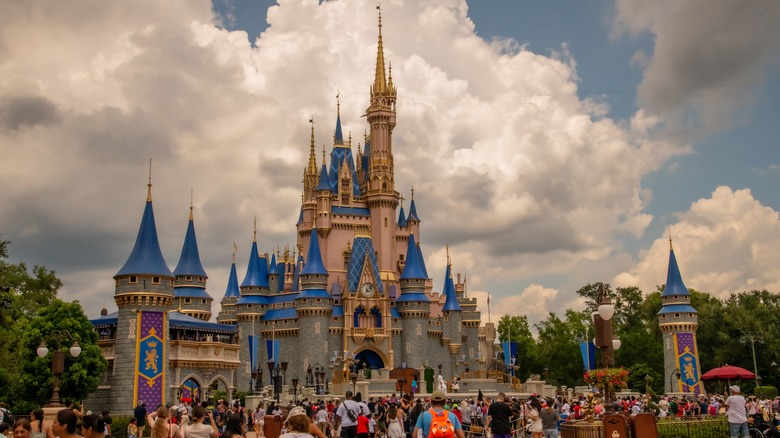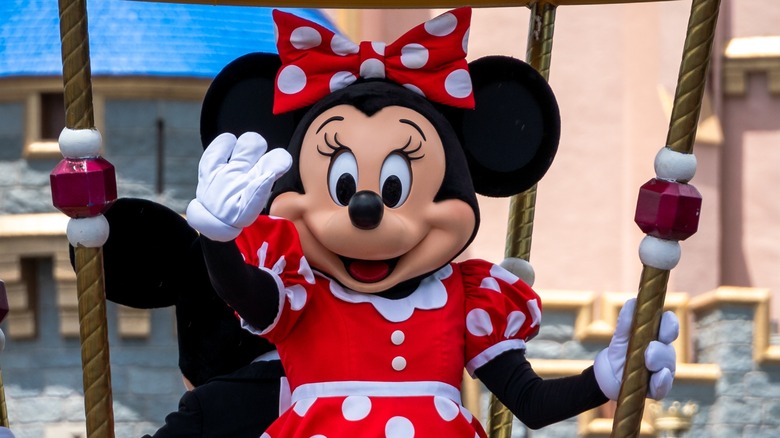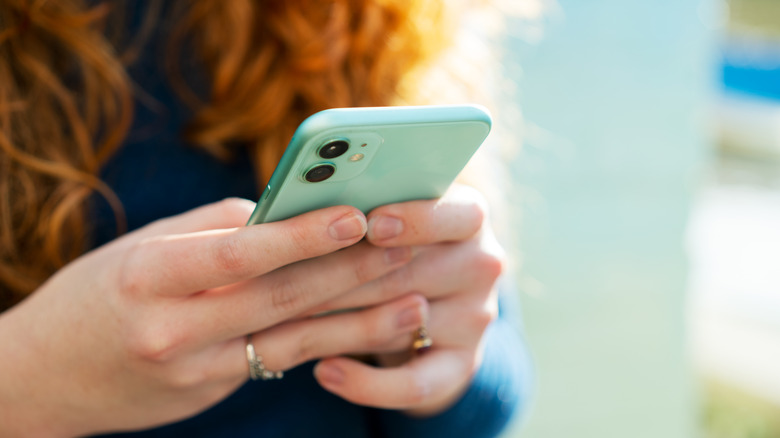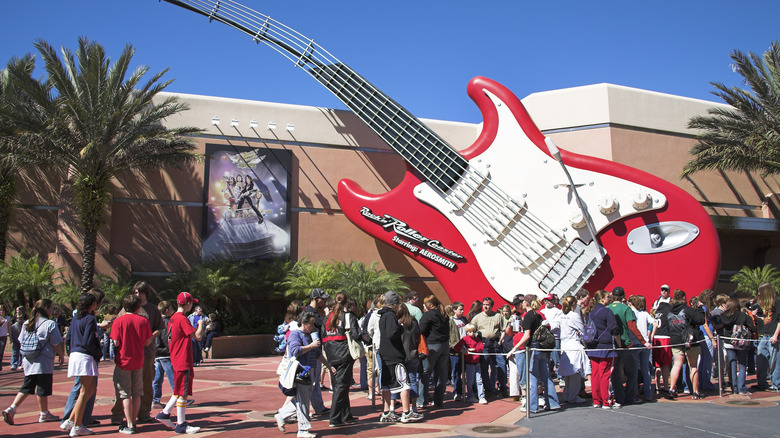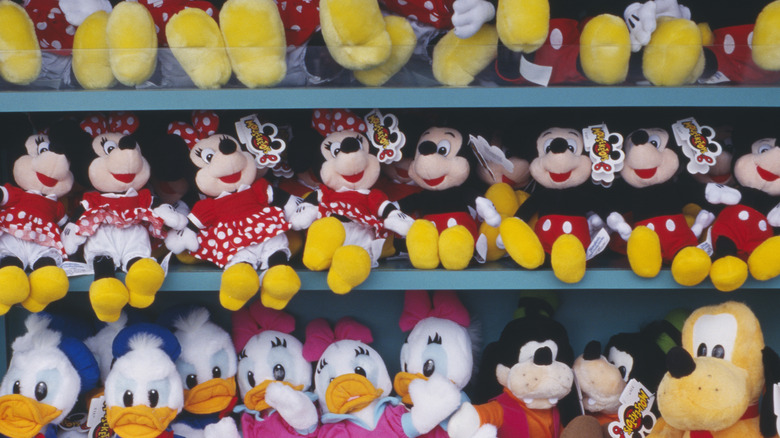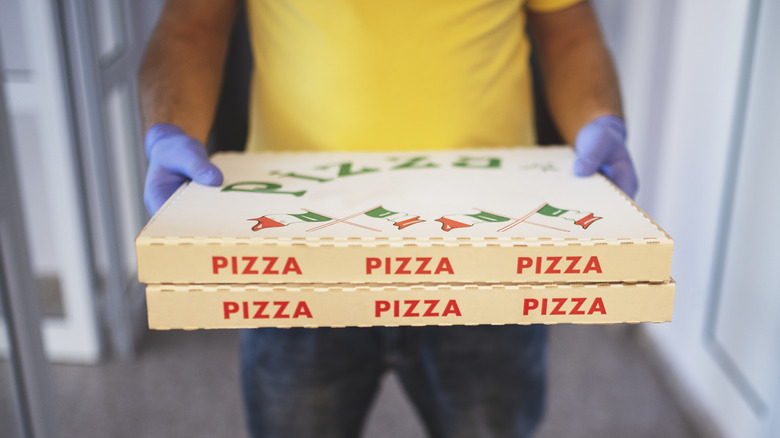The Biggest Scams Found At Disney World
Walt Disney World works really hard to make sure that all guests are happy, safe, and entertained during their visit to the park. From ensuring the grounds always stay mosquito-free to creating the perfect environment for a sensory-friendly tip, Disney is all about keeping the magic alive for everyone who walks through their gates no matter what. However, despite how hard Disney's Imagineers — that's what they call the brains behind the design and construction of all the theme parks, resorts, and experiences — work, there are still a couple of not-so-sweet details that happen to slip through the cracks every now and then.
Intentional or not, there's a long list of Disney scams and rip-offs out there that guests need to be wary of. And not only are these generally unscrupulous and disappointing, but they can also quickly turn your much-awaited trip from a dream come true into a frustrating nightmare worthy of Maleficent herself. Because, as it turns out, "The Most Magical Place on Earth" isn't always as magical as some people would like to believe.
Whether it's overpaying for your meals, unknowingly purchasing a fake ticket, losing out when purchasing souvenirs you don't really need, or getting the short end of the stick during a traditional pin-trading experience with someone who's pushing counterfeits, there's a shady side of Disney World that's generally hiding plain sight. Luckily, it doesn't take much to recognize them — it's just about being a little savvy and quick on your feet in order to successfully avoid them.
Paying less means paying more
Disney trips are already pretty expensive, especially with single-day tickets averaging between $109 and $189 for ages 10 and up, and the average cost of a meal ranging between $19 for quick service bites to $42 for a sit-down or table service experience per adult. With that in mind, it's no surprise that people aren't looking to spend any more than they have to during a Disney vacation — or, in some cases, cut back on costs. However, certain scams out there can make this challenge very stressful.
On the one hand, you've got the seemingly trustworthy third-party companies that claim to sell half-price tickets only to try and upsell you on purchasing a timeshare in Florida before you can get your hands on them. Then, you've got the scammers who sell counterfeit or expired tickets online to trick eager buyers into paying the price twice: once for the fakes and again for the real deal after they realize — a little too late — that they've been scammed.
Plus, it's not just outside parties who try to cash in on people's need to save. Disney is guilty of trying to get more out of unsuspecting visitors by using complicated marketing language that tricks them into purchasing more than they need to. That's why you should always, always check the fine print to ensure you're not getting ripped off. After all, that "5-day discount" might also apply to a 2-day trip — they just don't want you to know that.
Genie+ doesn't always have your best interest
Unfortunately, the scams don't stop once you're through the gates. First, there's the issue with Disney Genie+. Less about the money, the real scam here lies in how park organizers will try to control how you move around the grounds by manipulating key factors such as wait times, ride availability, attraction access, and crowd distribution. Using a GPS tracking system that's based primarily on crowd flow, the Genie+ app basically tracks your location and, if lines get too long, steers your decisions so you're more likely to leave the spot you're currently in to go spend money elsewhere.
So, if an area you're heading to is already at peak capacity, the Genie+ app will try to redirect you elsewhere — specifically, somewhere with smaller crowds and more revenue potential — even if it's nowhere near where you want to be. This way, park organizers can work their not-so-subtle magic to control crowd flow — keeping a better handle on how busy or "empty" (a word that doesn't really apply when it comes to Disney theme parks) certain areas of the park feel — as well as strategically adjusting wait times to try and keep visitors moving, shopping, and eating along.
Not only that, but the app is also notorious with Disney fans for being pretty difficult to understand, especially when you're in the midst of it all. Throw in the fact that users are only allowed to make one reservation at a time, as well as the limitation that you can only use Genie+ once per ride per day, and it becomes a lot clearer why most people suggest avoiding it.
Don't fall for the Single Rider Line
Speaking of shorter wait times, the same can be said about using Single Rider Lines. Although plenty of visitors consider them one of the best Disney World hacks for cutting wait times at busier attractions, the option comes with its own set of compromises that aren't always glaringly obvious. First, while you might save time — typically waiting about a quarter of what you'd spend in the regular line — there's always the possibility that you could end up waiting just as long as the standard queue.
However, the real catch comes down to the "ride experience" itself. When using Single Rider Lines, you'll likely get assigned to whatever seat needs filling. This means you're likely to miss out on perks like choosing your preferred seat (front row, anyone?) or tackling key roles in interactive attractions. This is particularly noticeable on rides like Millennium Falcon Smugglers Run, where your seat assignment directly impacts how you interact with gameplay.
Additionally, although several major attractions offer this option continuously (including Rock 'n' Roller Coaster and Smugglers Run at Hollywood Studios and Expedition Everest at Animal Kingdom), there are some that only operate their Single Rider Lines intermittently (Space Mountain at Magic Kingdom and Soarin' Around the World at EPCOT), which means there's no guarantee on what you'll get during your visit. This ultimately raises the question: Is trading off the chance to ride and experience the magic with your group truly worth a potentially shorter wait?
Park souvenirs are sold at mark-up prices
When it comes to Disney World merchandise — particularly seasonal items — prices have been steadily climbing over recent years. Holiday-themed apparel, for example, has reached some pretty eyebrow-raising levels. A basic Mickey holiday shirt today costs around $55, while holiday spirit jerseys hover near the $100 mark.
And these prices aren't limited to seasonal wear. Disney merchandise has seen significant increases across the board, from Minnie ears (jumping from $29.99 to $34.99) to the popular build-a-lightsaber experience at Savi's Workshop (from $219.99 to $249.99). Even basic items like MagicBands have increased from $14.99 to $19.99. Even worse, some third-party sellers have taken advantage of popular items like Disney pins, selling fake "scrapper" pins that often end up in circulation throughout the park's trading system — making it harder for genuine collectors to spot authentic merchandise.
That said, while many visitors consider Disney merchandise an essential part of their park experience, savvy shoppers are increasingly looking for alternatives to park purchases. From monitoring shopDisney.com for sales to exploring local Orlando retailers for similar items, there are plenty of other ways to capture the Disney magic without the premium park pricing.
Never order from the pizza flyers
Last but definitely not least, one of the most talked-about Disney World scams happens when you're back at your accommodation. Known as the "pizza flyer scam," this scheme targets park visitors by slipping unassuming takeout menus under the hotel door. And while most of these flyers might look legitimate at first, they're often created by scammers looking to steal credit card information from hungry (and exhausted) guests. That way, when an unsuspecting guest calls to place an order and provide payment details, their credit card information gets quickly compromised — and no pizza ever arrives.
To avoid falling victim to this scam, your best bet is to stick to verified dining options. Every Disney Resort usually has its own quick-service dining location, and many of them even offer legitimate room service options if all you and your tired feet want to do is enjoy your meal directly in bed. Alternatively, if you're craving outside food delivery, use legitimate services like UberEats or DoorDash, or ask a Cast Member for their recommendations of where to order. When in doubt, it's always better to keep a stash of snacks in your room than risk your financial security for a late-night pizza craving.
